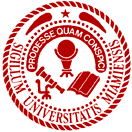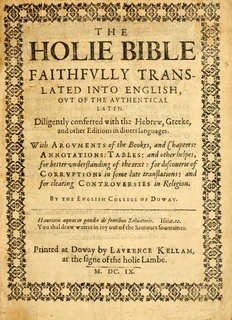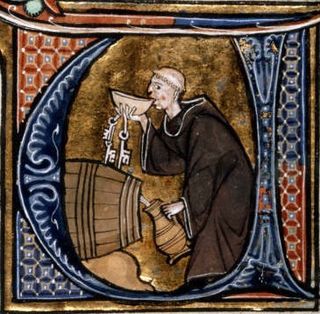
The New Testament of The Holy Bible: A Purified Translation was published in 2000. A year earlier, 40,000 copies of the Gospel of John from this translation had been mailed to Southern Baptist pastors. [1] It was translated by Stephen Mills Reynolds, and published by the Lorine L. Reynolds Foundation as a memorial to his wife. Reynolds (a graduate of Miami University, Princeton Theological Seminary, Princeton University, and Columbia University) [1] previously served on the translation committee of the New International Version

The New Testament is the second part of the Christian biblical canon, the first part being the Old Testament, based on the Hebrew Bible. The New Testament discusses the teachings and person of Jesus, as well as events in first-century Christianity. Christians regard both the Old and New Testaments together as sacred scripture. The New Testament has frequently accompanied the spread of Christianity around the world. It reflects and serves as a source for Christian theology and morality. Extended readings and phrases directly from the New Testament are incorporated into the various Christian liturgies. The New Testament has influenced religious, philosophical, and political movements in Christendom and left an indelible mark on literature, art, and music.

Miami University is a public research university in Oxford, Ohio, United States. The university was founded in 1809, although classes were not held until 1824. Miami University is the second-oldest university in Ohio and the 10th oldest public university in the United States. The school's system comprises the main campus in Oxford, as well as regional campuses in nearby Hamilton, Middletown, and West Chester. Miami also maintains an international boarding campus, the Dolibois European Center in Differdange, Luxembourg. The Carnegie Foundation classifies Miami University as a research university with a high research activity. It is affiliated with the University System of Ohio.

Princeton Theological Seminary (PTS) is a private, nonprofit, and independent graduate school of theology in Princeton, New Jersey. Founded in 1812 under the auspices of Archibald Alexander, the General Assembly of the Presbyterian Church, and the College of New Jersey, it is the second-oldest seminary in the United States. It is also the largest of ten seminaries associated with the Presbyterian Church (USA).
The Preface explains that in contrast to many modern English Bible translations it has “been purified of errors that have misled people, in some cases for centuries” (p. vii). The main issue that has been addressed in this “purification” is the drinking of alcohol by Christians, the translator believing that Christians should be teetotalers. “Dr. Reynolds goes to extraordinary lengths to support his convictions regarding the use of alcohol.” [2] Reynolds explained some of his translation decisions in Journal of Ethics and Bible Translation 1.1 (1995).

Many attempts have been made to translate the Bible into Late Modern and present-day English.

Teetotalism is the practice or promotion of complete personal abstinence from alcoholic beverages. A person who practices teetotalism is called a teetotaler or is simply said to be teetotal. The teetotalism movement was first started in Preston, England, in the early 19th century. The Preston Temperance Society was founded in 1833 by Joseph Livesey, who was to become a leader of the temperance movement and the author of The Pledge: "We agree to abstain from all liquors of an intoxicating quality whether ale, porter, wine or ardent spirits, except as medicine."

Alcohol, also known by its chemical name ethanol, is a psychoactive substance that is the active ingredient in drinks such as beer, wine, and distilled spirits. It is one of the oldest and most common recreational substances, causing the characteristic effects of alcohol intoxication ("drunkenness"). Among other effects, alcohol produces a mood lift and euphoria, decreased anxiety, increased sociability, sedation, impairment of cognitive, memory, motor, and sensory function, and generalized depression of central nervous system function. Ethanol is a type of chemical compound known as an alcohol, and is the only type of alcohol that is found in alcoholic beverages or is commonly used for recreational purposes; other alcohols such as methanol and isopropyl alcohol are toxic.
The translation has had mixed reviews, [3] with some focused on the matter of translating oinos , the Greek word that is traditionally translated "wine". [4]
The condemnation of alcohol consumption, and addressing texts that have been used to support it, begins in the Preface (p. iv), where the translator explains his view that Micah 2:11 has been previously mistranslated in a way that allows for the moderate consumption of alcohol. The matter of alcohol is also addressed by footnotes not only in passages that are traditionally translated with “wine”, but also on notes for passages such as Romans 1:17 “the just shall live by faith” (a verse usually associated with the doctrine of Sola fide rather than ethics of drinking wine), Romans 14:2,10, 1 Corinthians 11:25, 2 Timothy 2:15, Rev. 20:2.

Wine is an alcoholic drink made from fermented grapes. Yeast consumes the sugar in the grapes and converts it to ethanol, carbon dioxide, and heat. Different varieties of grapes and strains of yeasts produce different styles of wine. These variations result from the complex interactions between the biochemical development of the grape, the reactions involved in fermentation, the terroir, and the production process. Many countries enact legal appellations intended to define styles and qualities of wine. These typically restrict the geographical origin and permitted varieties of grapes, as well as other aspects of wine production. Wines not made from grapes include rice wine and fruit wines such as plum, cherry, pomegranate, currant and elderberry.

Sola fide, also known as justification by faith alone, is a Christian theological doctrine commonly held to distinguish many Protestant churches from the Catholic Church, as well as the Eastern Orthodox Churches and Oriental Orthodox Churches.
The book contains notes on the translator's translations of Micah 2:11 and Proverbs 23:31, It was reported in June 1999 that there was a plan to finish the entire Bible by 2004, [5] but that did not happen.

The Book of Micah is a prophetic book in the Tanakh / Old Testament, and the sixth of the twelve minor prophets. It records the sayings of Micah, whose name is Mikayahu, meaning "Who is like Yahweh?", an 8th-century B.C. prophet from the village of Moresheth in Judah. The book has three major divisions, chapters 1–2, 3–5 and 6–7, each introduced by the word "Hear," with a pattern of alternating announcements of doom and expressions of hope within each division. Micah reproaches unjust leaders, defends the rights of the poor against the rich and powerful; while looking forward to a world at peace centered on Zion under the leadership of a new Davidic monarch.

The Book of Proverbs is the second book of the third section of the Hebrew Bible and a book of the Christian Old Testament. When translated into Greek and Latin, the title took on different forms: in the Greek Septuagint (LXX) it became Παροιμίαι Paroimiai ("Proverbs"); in the Latin Vulgate the title was Proverbia, from which the English name is derived.
The translation does not use “thee” and “thou”, but innovatively uses an apostrophe to indicate the use of “you” (singular), as distinguished from “you" (plural) (p. 3, footnote 9).[ clarification needed ]











